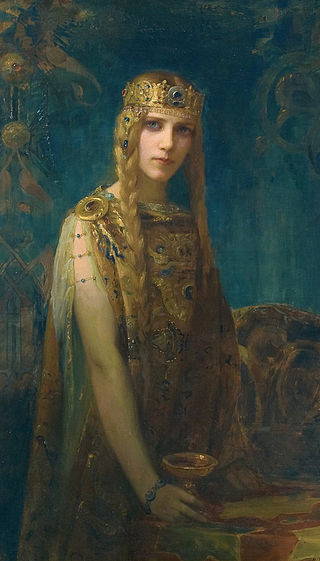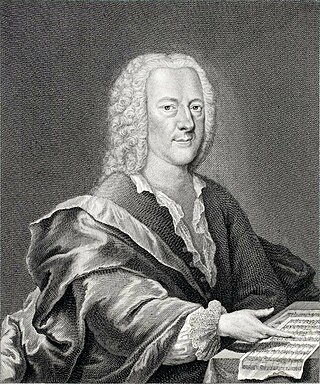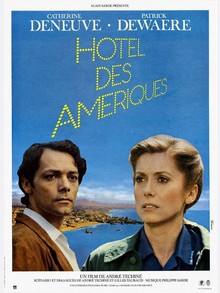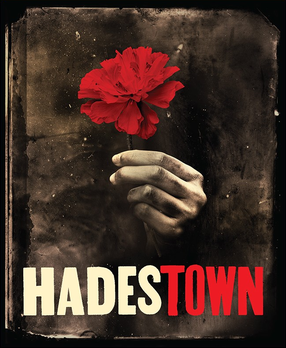
Orpheus in the Underworld and Orpheus in Hell are English names for Orphée aux enfers, a comic opera with music by Jacques Offenbach and words by Hector Crémieux and Ludovic Halévy. It was first performed as a two-act "opéra bouffon" at the Théâtre des Bouffes-Parisiens, Paris, on 21 October 1858, and was extensively revised and expanded in a four-act "opéra féerie" version, presented at the Théâtre de la Gaîté, Paris, on 7 February 1874.

Alphaville: une étrange aventure de Lemmy Caution is a 1965 French New Wave science fiction neo-noir film directed by Jean-Luc Godard. It stars Eddie Constantine, Anna Karina, Howard Vernon, and Akim Tamiroff. The film won the Golden Bear award of the 15th Berlin International Film Festival in 1965.

Orpheus is a 1950 French film directed by Jean Cocteau and starring Jean Marais. It is the central part of Cocteau's Orphic Trilogy, which consists of The Blood of a Poet (1930), Orpheus (1950), and Testament of Orpheus (1960). The film is partially based of Cocteau's 1926 play of the same title.

Orfeo ed Euridice is an opera composed by Christoph Willibald Gluck, based on the myth of Orpheus and set to a libretto by Ranieri de' Calzabigi. It belongs to the genre of the azione teatrale, meaning an opera on a mythological subject with choruses and dancing. The piece was first performed at the Burgtheater in Vienna on 5 October 1762, in the presence of Empress Maria Theresa. Orfeo ed Euridice is the first of Gluck's "reform" operas, in which he attempted to replace the abstruse plots and overly complex music of opera seria with a "noble simplicity" in both the music and the drama.

Iseult, alternatively Isolde and other spellings, is the name of several characters in the legend of Tristan and Iseult. The most prominent is Iseult of Ireland, the wife of Mark of Cornwall and the lover of Tristan. Her mother, the queen of Ireland, is also named Iseult. The third is Iseult of the White Hands, the daughter of Hoel of Brittany and the sister of Kahedin.
Eurydice is a 2003 play by Sarah Ruhl which retells the myth of Orpheus from the perspective of Eurydice, his wife. The story focuses on Eurydice's choice to return to Earth with Orpheus or to stay in the underworld with her father. Ruhl made several changes to the original myth's story-line. The most noticeable of these changes was that in the myth Orpheus succumbs to his desires and looks back at Eurydice, while in Ruhl's version Eurydice calls out to Orpheus perhaps in part because of her fear of reentering the world of the living and perhaps as a result of her desire to remain in the land of the dead with her father. Ruhl's script has been explicitly written so as to be a playground for the designer of the sets.

La descente d'Orphée aux enfers H.488 is an incomplete chamber opera in two acts by the French composer Marc-Antoine Charpentier. It was probably composed in early 1686 and performed either in the apartments of the Dauphin that spring or at Fontainebleau in the autumn. Charpentier himself sang the title role, joined by musicians of Mademoiselle de Guise and members of the Dauphin's little ensemble; it was Charpentier's last appearance with this ensemble.

The ancient legend of Orpheus and Eurydice concerns the fateful love of Orpheus of Thrace for the beautiful Eurydice. Orpheus was the son of Oeagrus and the muse Calliope. It may be a late addition to the Orpheus myths, as the latter cult-title suggests those attached to Persephone. The subject is among the most frequently retold of all Greek myths, being featured in numerous works of literature, operas, ballets, paintings, plays, musicals, and more recently, films and video games.

Orpheus is an opera in three acts by the German composer Georg Philipp Telemann. It was first performed in a concert version at the Oper am Gänsemarkt in Hamburg on 9 March 1726. The anonymous libretto is based on the 1690 opera Orphée by Michel Duboullay, originally set by the French composer Louis Lully. Most of the work is in German but it also contains passages in French and Italian drawn from famous operas by Handel and Jean-Baptiste Lully. The music to these words is Telemann's own, however. The manuscript score of Telemann's Orpheus was not rediscovered until the late 20th century.

In Greek mythology, Orpheus was a Thracian bard, legendary musician and prophet. He was also a renowned poet and, according to the legend, travelled with Jason and the Argonauts in search of the Golden Fleece, and even descended into the underworld of Hades, to recover his lost wife Eurydice. Orpheus was also called the ruler of Bistonian Pieria.

Hotel America is a 1981 French romantic drama film directed by André Téchiné, starring Catherine Deneuve and Patrick Dewaere. The film, set in Biarritz, tells the ill-fated romance of mismatched lovers. This is the first of several collaborations between Téchiné and Deneuve, who became his favorite actress.

Eurydice was a character in Greek mythology and the Auloniad wife of Orpheus, whom Orpheus tried to bring back from the dead with his enchanting music.

Hadestown is the fourth studio album by American folk singer-songwriter Anaïs Mitchell, and was released by Righteous Babe Records on March 9, 2010. The concept album, which became the basis for the stage musical of the same name, follows a variation on the ancient Greek myth of Orpheus and Eurydice, where Orpheus must embark on a quest to rescue his wife Eurydice from the underworld. It has been advertised as a "folk opera". Several of the songs feature singers other than Mitchell, including Justin Vernon, Ani DiFranco, Greg Brown, Ben Knox Miller, and The Haden Triplets.

Le feste d'Apollo is an operatic work by Christoph Willibald von Gluck, first performed at the Teatrino della Corte, Parma, Italy, on 24 August 1769 for the wedding celebrations of Ferdinand, Duke of Parma and Archduchess Maria Amalia of Austria.

Parking is a French fantasy and musical film from 1985. It was directed and written by Jacques Demy, starring Francis Huster, Laurent Malet, and Jean Marais.

The Medusa Frequency is a 1987 novel by Russell Hoban. Written in a lyrical, often magic realist style, it crosses a number of genres including comedy and fantasy. It uses the story of Orpheus to "meditate on art and reality and love and fear and fidelity and betrayal".

Madeleine Férat is an 1868 novel by the French writer Émile Zola. It was Zola's fourth novel, written immediately after Thérèse Raquin, which had been Zola's first commercial and artistic success. It was published in 1868, first under the title La Honte in serial form, then in volume under the title Madeleine Férat by Albert Lacroix, with a dedication to the painter Manet. It is the fictionalised version of a play which had not been accepted.

Hadestown is a sung-through musical with music, lyrics, and book by Anaïs Mitchell. It tells a version of the ancient Greek myth of Orpheus and Eurydice. Eurydice, a young girl looking for something to eat, goes to work in a hellish industrial version of the Greek underworld to escape poverty and the cold, and her poor singer-songwriter lover Orpheus comes to rescue her.
Shredder Orpheus is a 1989 film by Robert McGinley that has later become a cult classic, based on the myth of Orpheus and Eurydice. It was Amy Denio's film debut.

Eurydice is an opera composed by Matthew Aucoin with a libretto by Sarah Ruhl based on her 2003 play of the same name, a retelling of the legend of Orpheus and Eurydice. It had its premiere at the Los Angeles Opera on February 1, 2020, with Aucoin conducting. It had its Metropolitan Opera premiere on November 23, 2021.


















